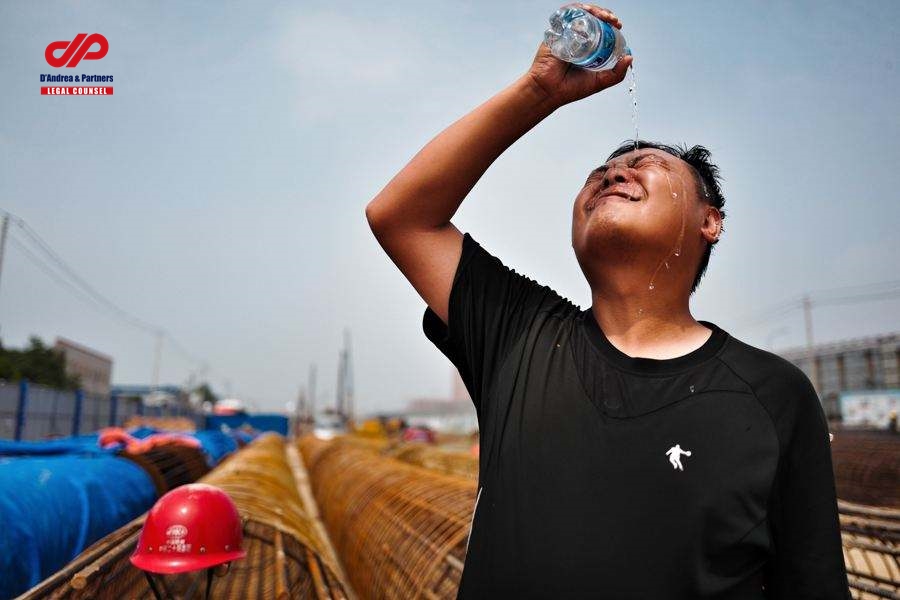During the hot summer season in China, outdoor workers are exposed to significant risks in regard to health & safety, which raise general public concern as well as further considerations as unfortunately, heat strokes or even accidental death are not infrequent for those who are engaged in outdoor labor and services.
Therefore, with the aim to protect employee’s health, promote their wellness and contain heat-related risks, the State Administration of Work Safety, together with the Ministry of Health, the Ministry of Human Resources and Social Security and All China Federation of Trade Unions have implemented the Administrative Measures for Occupational Heat Stress (the “Measures”), which entered into force in 2012 and is effective at National Level.
The aforesaid measures are aimed at establishing limitations as for the possibility of outdoor work depending on the weather conditions (in particular, temperature and humidity), a pecuniary subsidy system for employees, a health prevention and check system for outdoor workers, and an administrative and trade union surveillance system.
With this article, we would like to inform employees and enterprises about the regulatory framework on the matter in order to allow, on one hand, outdoor workers to be aware of their statutory rights and, on the other, inform enterprises on the relevant regulations in order to ensure they are fully compliant with the aforesaid regulations and avoid unnecessary risks.
As for the limitations for outdoor work, art. 8 outlines the measures that employing units shall adopt, under high temperature conditions, to reduce labor intensity and the outdoor operation time. In more detail, when the daily maximum temperature is ≥ 40℃, the employing unit shall suspend outdoor operation; when the daily maximum temperature is ≥ 37 ℃ but < 40 ℃, the outdoor working hours shall not be more than six, and the consecutive working hours shall not exceed the limit prescribed by the State; when the daily maximum temperature is ≥ 35 ℃ but < 37℃, the employing unit shall arrange for shift work, reduce the consecutive operation time, and shall not arrange overtime outdoor work. Particular limitations apply for juvenile workers and female employees who have been pregnant, as they cannot be assigned to work outdoors if the temperature is above 35 degrees, or even in the workplace if the temperature is above 33 degrees.
As mentioned, the Measures at art. 17 have introduced a subsidy system for employees. This means that employees engaged in high temperature operations are entitled to receive a subsidy, to be added to the total wage, if they are assigned to work outdoors and the external temperature is not less than 35 degrees Celsius. The same applies when the (indoor) workplace temperature cannot be decreased to below 33℃.
As the standards on the high temperature subsidies shall be formulated by the provincial administrative department of human resources and social security jointly with other relevant departments, there are differences at local level. For example, based on the increase approved on June 2019, employees in Shanghai, Jiangsu and Zhejiang will get a monthly subsidy of 300 yuan. In some other regions, the standard for high-temperature subsidies is set by the day. Anhui has raised its subsidy standard from 10 yuan per day to 15 yuan, while Sichuan adjusted the local standard from 8 to 12 yuan per day to 10-18 yuan. Hebei is the only region that sets an hourly high-temperature subsidy standard and has raised the local standard to 2 yuan per hour for outdoor workers and 1.5 yuan per hour for indoor workers.
With the aim to protect the health of employees, the Measures also provide that the employing unit with occupational exposure to heat stress shall appoint a specific person to monitor high temperatures daily, detect and assess the occupational hazards according to the regulation, provide occupational health training for the employee and provide sufficient occupational heat stroke prevention beverages. Moreover, the employing unit shall establish dedicated rest areas in high temperature areas, equipped with stress prevention facilities (such as air-conditioning) and formulate a contingency plan against heat stroke.
The Trade Union has a key role in implementing the Measures. In fact, art. 20 and 21 of the Measures provide that the trade union shall supervise the execution of the occupational heat stress prevention measures, request the employment unit to rectify violations, and in case of refusal, request the relevant department to deal with such infringement/s according to law. Moreover, if the employing unit breaches the laws and administrative regulations of the occupational disease prevention and work safety, the relevant departments under the people’s governments at or above the county level shall, within the scope of their respective functions and responsibilities, order the rectification or cease operations. Serious violations will be punished pursuant to the relevant regulations, which may also acquire a criminal relevance in instances of death or injury of employees.
*This article will be published on the Nanjinger magazine on August 2020.



